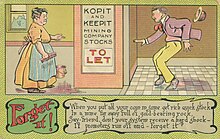Page version status
This is an accepted version of this page
| This article needs additional citations for verification. Please help improve this article by adding citations to reliable sources. Unsourced material may be challenged and removed. Find sources: "Get-rich-quick scheme" – news · newspapers · books · scholar · JSTOR (January 2020) (Learn how and when to remove this message) |

A get-rich-quick scheme is a plan to obtain high rates of return for a small investment. Most schemes create an impression that participants can obtain this high rate of return with little risk, skill, effort, or time.
The term "get rich quick" has been used to describe shady investments since at least the early 20th century.
Get-rich-quick schemes often assert that wealth can be obtained by working at home. Get-rich-quick schemes that operate entirely on the Internet usually promote "secret formulas" to affiliate marketing and affiliate advertising. The scheme will usually claim that it does not require any special IT or marketing skills and will provide an unrealistic timeframe in which the individual could make hundreds of thousands, if not millions of dollars. Since the growth in popularity of non-fungible tokens (NFTs) in the early 2020s, skeptics have accused many NFT projects of resembling get-rich-quick schemes.
Legal and quasi-legal get-rich-quick schemes are frequently advertised on infomercials and in magazines and newspapers. Illegal schemes or scams are often advertised through spam or cold calling. Some forms of advertising for these schemes market books or compact discs about getting rich quick rather than asking participants to invest directly in a concrete scheme.
See also
- Advance-fee scam
- Envelope stuffing
- Ripoff
- HYIP
- No such thing as a free lunch
- Land banking
- The Secret
References
- 'Get Rich Quick' Insurance from the Inside", The World's work, Volume 22, (1911)
- S.A. Nelson "The Blockite and the Get-Rich-Quick Man", Everybody's Magazine, vol 10, 1904.
- Needham, Jack (26 July 2021). "'The misconception is that NFTs are like a get rich quick scheme. That's not really how it works.'". Music Business Worldwide. Retrieved 26 June 2022.
- Kelly, Jemima (17 March 2021). "NFTs are the latest get-rich-quick scheme for the 'cryptosphere'". Financial Times. Retrieved 26 June 2022.
- Brittain, Blake (6 May 2022). "Hermes lawsuit over 'MetaBirkins' NFTs can move ahead, judge rules". Reuters. Retrieved 26 June 2022.
Bibliography
- Leila Schneps and Coralie Colmez, Math on trial. How numbers get used and abused in the courtroom, Basic Books, 2013. ISBN 978-0-465-03292-1. (Eighth chapter: "Math error number 8: underestimation. The case of Charles Ponzi: American dream, American scheme").